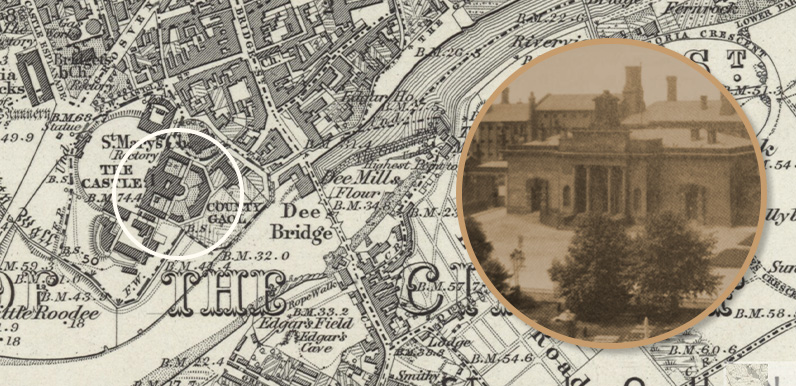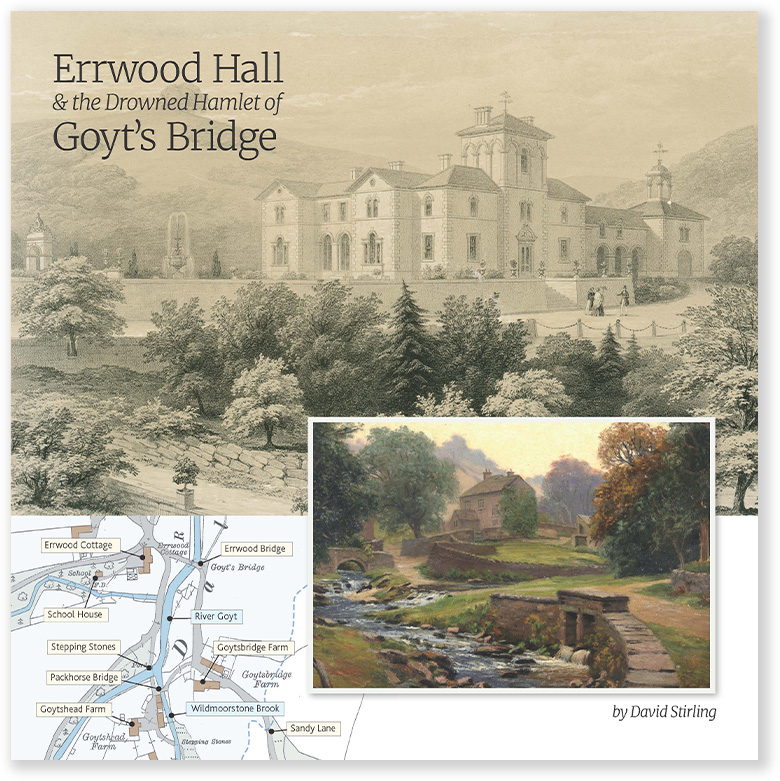Above: Dale was tried in the courtrooms at Chester Castle, a forbidding mass of grey stone buildings squatting beside the River Dee.
The castle still houses the Crown Courts, accessed though the impressive portico, which Dale would probably have passed through all those years ago.
The trial of Joseph Dale, the only one of the three accused to face justice, was drawing to an end. One of the last witnesses to give testimony was Thomas Boncock, a waiter at the Greyhounds public house in Manchester.
Boncock had served Dale, Taylor and Platt on Tuesday morning, the day before William Wood’s brutal murder. And again, just two days later, on Thursday morning…
…saw the prisoner in the tap-room, on Tuesday the 15th July, dressed in a blue coat, black trowsers, and a yellow striped waistcoat; he had a gill of beer. Had seen him before. Platt and Taylor came in about half-an-hour after, and enquired for him.
On the Thursday following, the 17th, saw them all come in together about a quarter past five. (The witness here described the dresses in which they appeared, which have been already shewn to have been purchased in Macclesfield.)
When he saw them before on the 15th, they had on the old dresses. None of the three had the same cloathes on, on the 17th, which he saw them have on, on the 15th.
He asked Dale, where he had been to have a new suit of cloathes on, he said he had been amongst his friends; he challenged them all three with having new dresses on, but the other two gave no answer.
Soon after Dale and Platt left the house, Dale first and Platt soon after. Taylor stopped a good part of an hour, until Mr. Lavender then came in and seized him.
The arrest of Dale
When Dale was discovered at Liverpool Docks some three weeks later, it was again Stephen Lavender who went to arrest him. Lavender explained…
…he took the prisoner into custody on Friday the 8th of August, in Liverpool, and took him to Manchester the next day, Saturday; took him to the police office; and when there, asked him if he was disposed to give any account of the transaction, having previously told him that he need not answer any questions unless he chose it, when he related the following:
Himself in company with Platt and Taylor left Manchester about dinner-time on the 16th; they left Manchester for the purpose of going to Chapel-en-le-Frith wakes. On the road, a short distance on the other side of Bullock Smithy, they were overtaken by an elderly person, with whom they got into conversation.
They walked a considerable distance together, till they came to the old road leading from Stockport to Whaley; that they proceeded on the old road some short distance, when Platt told prisoner [Dale] to go on to the next public-house, and wait till Taylor and him came up with him; and that Platt gave him six pence to enable him to get some entertainment.
That he went to the public-house, and waited near an hour and a half before they came; when they arrived they appeared to be in a great hurry, and observing some blood upon Platt’s shoulder and trowsers, he asked them what was to do; the only reply that they gave him was “Come along.”
He then went on with them, and they kept running nearly the whole of the way till they came to Buxton; that they all three slept at a small public-house on the other side of Buxton, which place they left early in the morning, and came to Macclesfield, where Platt purchased some new cloathes for them all.
They left part of the old cloathes at the public-house at Macclesfield, where they had been at, and the remaining part at the shoe-maker’s. All the money that he had had from them had been £3 and some silver. They returned to Manchester that evening, and that he (prisoner) went to Liverpool the following morning, where he remained till taken into custody.
Found prisoner had been at Manchester that night, and found him in Liverpool the next morning; had no reason to know that what prisoner said was not true, and from first to last he denied having anything to do with the actual murder.
Never heard of prisoner being involved in any criminal charge before, and as far as he knew was of respectable friends; had had occasion to call upon them since this affair, and found them to be respectable people for their station.
So fas as he has known prisoner he seems a mild tempered lad; he seemed a young beginner in these things, and told a straight-forward story; he was about 5ft. 5in.
Dale pleads innocent
Here the evidence for the prosecution closed; and the prisoner in his defence said, he was innocent either of the robbery or the murder. He had nothing further to say.
George Hughes, stucco-manufacturer, of Manchester; George Burgess, formerly of Knutsford, and lately constable of Bucklow; and George Henshall, cotton-spinner, severally gave the prisoner the character of being a very peaceable, quite lad, always good tempered, and kind to his parents.
The awful decision
At half past five in the evening, the Learned Judge (Mr. Justice Warren) commenced summing up the evidence, and stated to the Jury what was necessary to constitute a murder, proceeded to re-capitulate the evidence with great precision, and concluded his remarks with observing, that in this case a most barbarous murder had been committed by some one, and the question was not whether the prisoner was the man who struck the blow; if he was by at the time, aiding, and abetting or consenting to the deed, he was equally guilty in point of law, as if he actually inflicted the mortal wound.
The evidence which had been brought forward as to character could be of no avail where the facts proved were of such a nature as to be conclusive of guilt; and considering all the circumstances of the case, it remained for them to judge whether, in their opinion, the prisoner was guilty of the crime laid to his charge or not.
The Jury, after a consultation of about two minutes’ duration, returned a verdict of GUILTY.
The prisoner heard the awful decision without any apparent emotion; and shortly afterwards a glass of water or lemonade was brought, which he drank off at a draught.
Previous: Part 7: Macclesfield witnesses : Next: Part 9. Judgement of death

